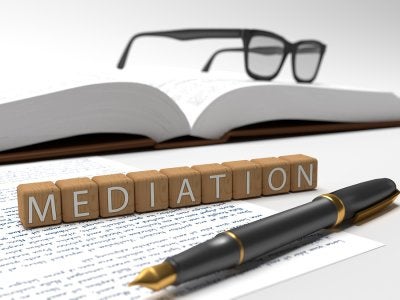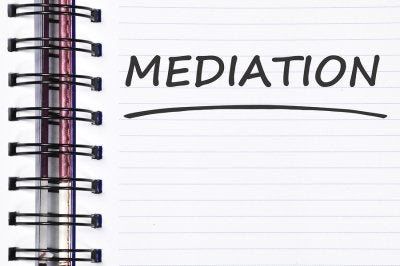-
Tips for Talking to Your Family About Advanced Medical Directives
It may not be pleasant to think about what might happen to you if you become incapable of expressing your care preferences , but it is necessary to prevent interpersonal conflicts among family members. The document in which you can specify your healthcare preferences is called an advanced medical directive or a living will. Consider talking to an estate planning attorney in Baltimore about creating your advanced medical directive before speaking with your family about it.
When you are ready to discuss your living will with your family, watch this interview with a physician to get some helpful tips. He recommends that you first reassure your loved ones that you are not seriously ill, depressed, or otherwise experiencing trouble. This physician also discusses what adult children might consider when broaching this subject with their aging parents and he explains the types of decisions that a living will can encompass.
-
Recognizing the Advantages of an Advanced Medical Directive
It isn’t always easy to make arrangements for your own future care. Many people avoid estate planning matters because they simply don’t want to think about dying or becoming incapacitated. Others may avoid visiting an estate lawyer in Baltimore because they feel they are too young to worry about that sort of matter. But the unfortunate truth is that accidents and illnesses can befall anyone at any time, regardless of age or current health. Talk to an estate planning attorney about creating an advanced medical directive.

You can rest assured knowing that you’ve made arrangements.
Certain estate planning documents, such as wills, need to be updated from time to time. Usually, an advanced medical directive only needs to be done once. After you’ve completed this document, you may feel some peace of mind knowing that this important estate planning task is finalized.
You will receive the medical care you want.
Advanced medical directives empower individuals to choose their own medical care, even after they become incapacitated. This document will specify exactly which type of care you do and don’t want to receive in the event you fall into a coma, require life support, or otherwise experience some sort of calamity. With this document, you can spell out your wishes pertaining to life support, end of life care, palliative care, and organ donation. You can also use this document to specify the types of care that you do not want administered to you.
Your relatives will be free of the burden of making decisions.
When a loved one becomes incapacitated, the burden of making decisions often falls to the closest family members. Deciding whether to keep a parent, sibling, or other loved one on life support or not can be an impossible choice to make. By establishing an advanced medical directive, your loved ones won’t be forced to make these difficult decisions and they won’t face the possibility of regret.
You will reduce the possibility of family conflicts.
It is not unheard of for a family to be torn apart over a disagreement about what an incapacitated loved one would have wanted in terms of life support or other medical care. You’ve spent a lifetime caring for and cherishing your family. You can preserve family bonds by spending a little time with an estate lawyer to create an advanced medical directive.
-
Divorce Mediation Explained
Resolving family law matters often involves litigation, but there may be a better solution for your case. Consider speaking with a mediation lawyer in Baltimore about divorce mediation. As you’ll learn when you watch this video, divorce mediation is a process that is facilitated by a neutral individual.
During a mediation session, the mediator guides each party in identifying the issues that need to be resolved, each party’s position on the issues, and possible solutions such as compromises. Through divorce mediation, you and your spouse may be able to agree on arrangements for property division, child custody, visitation, child support, and spousal support. Reaching agreements in mediation can help you and your spouse avoid the hassle and expense of going to trial.
-
Common Questions About Adoption Mediation
Mediation is an invaluable tool for resolving many different types of disputes, including disputes that involve adoption. Adoption mediation can help adoptive parents and birth parents reach mutually agreeable arrangements that allow them to avoid prolonged and contentious court battles. A mediation lawyer in Baltimore can assist your family in all types of circumstances, including independent adoptions, in-state and out-of-state adoptions, contested adoptions, and many others.

What is a post-adoption communication agreement?
One of the most common problems that adoptive parents encounter is post-adoption contact. An adoption could be proceeding smoothly when one or both of the birth parents abruptly demands ongoing contact with the child after the adoption. Adoptive parents should not feel pressured to immediately agree to the demands of the birth parents. Instead, they can turn to adoption mediation to resolve the conflict by producing a mutually agreeable post-adoption communication agreement. This is a written agreement that is signed by both sets of parents. The purpose of the agreement is to serve the best interests of the child. The agreement outlines the specific contact that will be allowed, including the type of contact (e.g. phone calls, visits, or letters) and the frequency of contact. If visits will be allowed, the agreement should specify the location of the visit and how long it will last. Post-adoption communication agreements, much like child visitation orders, can also make arrangements for dealing with special occasions like birthdays and holidays.
What is a contested adoption?
A contested adoption occurs when a birth parent agrees to place the child for adoption and the other birth parent objects to the adoption. Typically, the birth mother initiates adoption proceedings and the birth father later objects to them. Usually, the law grants preference to birth parents when assessing parental rights. However, adoption mediation can still be useful in contested adoption. In some cases, the objecting birth parent may decide to allow the adoption to proceed if he or she will be granted post-adoption contact.
How can adoptive parents prepare for adoption mediation?
The best way to prepare for adoption mediation is to consult the mediation lawyer. Learn what to expect from a typical mediation session, understand the goals and limitations of mediation, and consider adjusting your mindset. To reach a compromise that is in the child’s best interests, it may be necessary to be open-minded toward the needs of the other set of parents.
-
Why Should You Consider Settling Alimony Disputes in Mediation?
It should come as no surprise that alimony can be an extremely difficult part of divorce negotiations. However, some couples are able to minimize their conflict and come to an agreement over alimony in mediation. Mediation differs from court in that it is not about winners and losers. Instead, mediation focuses on helping both parties work together to come up with a viable solution that feels right to everyone. There are several reasons why choosing mediation in Baltimore over court can be beneficial.
One significant benefit of going to mediation for alimony is that it is less expensive and time-consuming. Courts have to consider a long list of factors before making a ruling on alimony, which can drag out this contentious issue and increase the stress surrounding the divorce. Settling alimony in mediation allows you to circumvent court-dictated alimony standards and come up with a better solution that meets everyone’s needs. Working together in mediation also sets the stage for cooperating on more issues in the divorce, so you can reduce the amount of stress associated with the process.

-
Preparing for Mediation in a Paternity Dispute
Sometimes, part of child support and child custody cases involves addressing the issue of paternity. This area of family law can be difficult for everyone involved, but it is necessary in some cases to take this important step before any decisions about child support are made or after child support is in place but one parent has a doubt about paternity. Although some paternity tests are ordering the courtroom, disputes about paternity can also be addressed during mediation. Going to mediation in Baltimore to deal with questions surrounding paternity and child support is similar to any other mediation experience. If you have a mediation session planned, here are some tips for preparing.

Consider Your Personal Statement
Most mediation sessions begin with each party making a brief statement about the issues you hope to resolve during mediation and how you view the dispute from your perspective. Although you will be allowed to speak without interruption while making your statement, keep in mind that the other party’s attorney may be present and could use information shared in mediation in court should the negotiation fail. Talk through your statement with your lawyer to avoid any issues. For instance, if your stance is that a paternity test should be required, avoid saying anything that suggests that you know the child is yours.
Prepare for Questions
The mediator will likely ask both sides questions to gather information that could be helpful during the negotiation. These questions help the mediator identify possible solutions that could work for both sides. Remember that mediators do not provide legal advice. Your lawyer should be present at all mediation sessions in case you have legal questions and to review any documents before you sign them.
Be Open to the Process
Mediation is designed for both sides to come away feeling satisfied with the agreement. One side does not win while the other loses. Your lawyer can help you understand the strategies the mediator may use to help you reach an agreement. Remember that your paternity dispute is not resolved until an agreement is signed, so you have nothing to lose by entering negotiations.
-
What to Expect During a Business Dispute Mediation Session
Business disputes can arise over many situations, including miscommunications, disagreements over verbal contracts, and conflicts within your employee pool. Handling business disputes through litigation can be a costly and drawn-out process; by contrast, mediation can help conflicting parties reach an agreement much more quickly, often at lower cost. Knowing what to expect from business dispute mediation in Baltimore can help you better determine whether the mediation process is right for you.

The Role of the Mediator
When you seek business dispute mediation, you and the party with whom you have a conflict will meet with a mediation attorney. This mediator will serve as an impartial third party to help you reach a resolution that is satisfactory to both parties. Prior to your mediation session, you may have the opportunity to speak with the mediation attorney in person or over the phone without the other party present, allowing you to present your side of the story. During mediation, the mediator may take either an active or a passive role, depending on your preferences.
The Process of Conflict Resolution
Mediation is a beneficial conflict resolution process , allowing both parties to discuss and reach a solution in private without the oversight of the public or a judge and courtroom staff. Depending on the type of mediation you prefer, your mediator may simply listen to both parties and point out the pros and cons of the potential solutions offered with complete neutrality. Alternatively, your mediation attorney may take a more active role that involves structuring the discussion and proactively guiding both parties toward a conclusion. Mediation can involve both joint sessions, during which all parties and their attorneys are present, as well as private caucus meetings, which allow each party to meet with the mediator privately as the process continues. Caucus meetings allow the mediator to evaluate both sides of the issue and make better-informed suggestions during joint sessions, and all information discussed during a private caucus remains confidential. Once a solution has been reached, your attorneys will use this information to draw up a legally-binding agreement.
-
Estate Planning for Domestic Partners
For couples who choose domestic partnerships over marriage, protecting legal rights is essential. While married couples enjoy certain privileges under the law, domestic partners are not always afforded the same rights. By working with an estate lawyer in Baltimore with experience with domestic partnerships, you can make plans for your estate and feel confident that your loved ones will be protected after your death.
For domestic partners, the law does not assume that your surviving partner is your intended heir in the same way it does for married couples. This distinction could cause issues for your estate in the probate process, as well as uncomfortable family disputes. By drawing up estate planning documents, you can ensure your estate is administered as you intend. With the help of an estate lawyer, you and your partner can draw up individual wills and various trusts to make your final intentions clear. It is also possible to create trusts that benefit your partner while maintaining your privacy. Consult with an estate lawyer to determine the best estate planning procedures for your specific case.

-
Solving Marital Asset Disputes in Mediation
During a divorce, a couple’s assets must be divided to the satisfaction of both parties. These assets may include money, property, vehicles, and personal items. When partners disagree on the division of property and assets, it is the role of a mediation lawyer to step in and assist the couple to ensure that the divorce process can proceed. During divorce mediation in Baltimore , you and your spouse will meet with an agreed-upon mediation attorney to reach an agreement concerning your assets without the influence or mandates of a judge.

The Mediation Process
When you meet to solve a dispute over marital assets via mediation, you and your spouse will typically meet with your mediation attorney without the company of your divorce lawyers. Instead, the mediation attorney will provide any advice or family law information you may need during the mediation process. Once you have both signed a mediation agreement, you will discuss your concerns with the mediator, who will attempt to guide you and your spouse to a resolution regarding the way in which assets will be divided following your divorce. You may need several sessions with the mediation attorney to reach a satisfactory agreement. Once this agreement has been reached, your mediator will draw up a settlement agreement, which you and your divorce lawyer may review before signing.
The Benefits of Mediation to Divide Assets
There are several benefits associated with seeking mediation services if you and your spouse are having difficulties dividing assets during a divorce . The mediation process is confidential and informal, allowing you to reach an agreement without the oversight of a judge or in the setting of a formal courtroom. Additionally, the divorce mediation process is often faster and more cost-effective than an in-court settlement mandated by a judge. This process gives you and your spouse the opportunity to work out the division of your assets in a way that is acceptable to you both, rather than being forced to follow the decree of a judge.
-
Understanding Mediation
Mediation services in Baltimore play an important role in dispute resolution. Mediation is an alternative to litigation when two or more parties cannot reach an agreement on their own. The parties sit down with a mediator, who is a neutral third-party. They discuss the issue, consider proposed solutions, and try to reach an agreement that does not involve having an attorney file a petition or claim in court. The mediator can draft the terms of the settlement into a written document to help prevent future disagreements on that issue.
You can hear more about mediation services by watching this introductory video. You’ll learn about some of the benefits of choosing mediation instead of litigation. You’ll also hear more about the role of the mediator. For instance, the mediator cannot force either party to accept any particular resolution. If either party is dissatisfied with the outcome of mediation, he or she could choose to pursue the matter in court.

